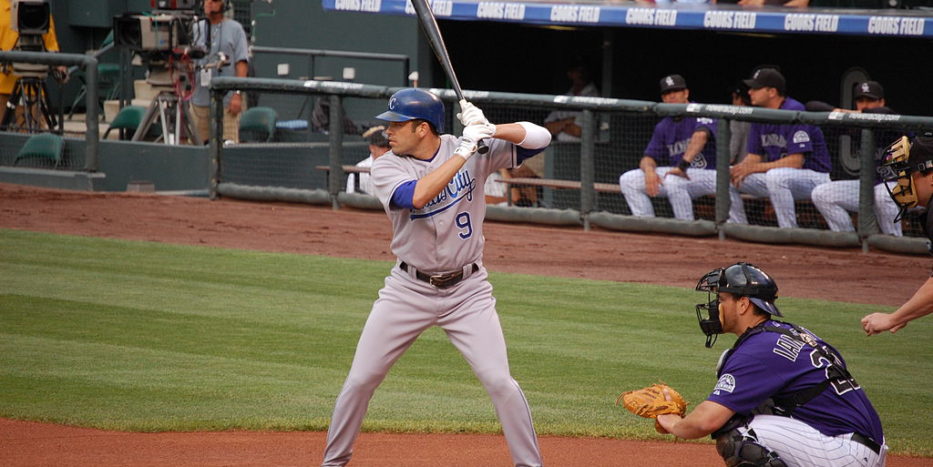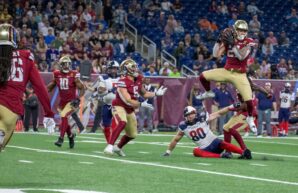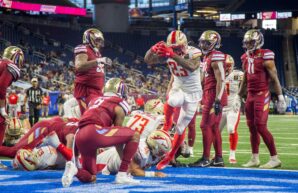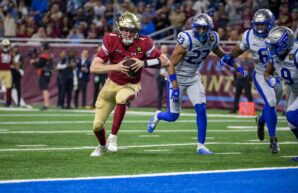
The departure of David DeJesus leaves the Chicago Cubs without a true veteran voice in the clubhouse. Photo/Wikimedia
[dropcap]A[/dropcap]s a member of the American League and Kansas City Royals, David DeJesus displayed his professionalism and proper approach to the game even at an early age.
From his perch as the GM of the Boston Red Sox, TheoEpstein watched DeJesus play the game the right way, hustle on every play, and always set a positive example on the field. Besides his exemplary on field actions, DeJesus had developed quite the reputation as a clubhouse leader and mentor to teammates. When Epstein took over the Chicago Cubs in October of 2011, his first major league signing was David DeJesus.
At age 33, DeJesus became the quintessential clubhouse leader and veteran voice of the Chicago Cubs.
Unfortunately, the demand for DeJesus from contenders became too much of a temptation for Epstein, and in a rebuilding stage, DeJesus was traded to the Washington Nationals in Aug. of 2013 for a prospect. The previous month, Epstein traded Alfonso Soriano, who was also looked upon as a clubhouse leader. But Soriano’s on-field antics – like watching his home runs fly out of the park instead of running on contact – made his presence as a leader unnecessary.
With the Cubs debuting eight players in 2014, there is a need for a veteran voice in the clubhouse for 2015.
The Cubs could introduce as many as six new players to the Major leagues next year in addition to the 11 who made their debuts less than three years ago. With a world championship on his resume, Nate Schierholtz was signed in Dec. 2012 to serve as the veteran voice. Although Schierholtz played the game the right way, his lack of on field production and non-vocal approach never allowed him to be an undisputed leader.
Mike Sweeney plays the game the right way, but he was brought to the Cubs to resurrect his career and be used a trade piece to gather more minor league talent.
Since the departure of DeJesus, the Cubs have simply not had a veteran who performed on the field and commanded respect in the clubhouse as well as set great examples of how to play the game the right way.
In an interview, Cubs GM Jed Hoyer stressed how “it’s important to have some veteran guys with good approaches that these guys can lean on, because I do think right now we don’t really have guys that have played for a long time in the big leagues that have been through the ups and down as much.’’ The search for a veteran clubhouse leader has become a priority, and here are the main reasons why:
- Developing Good Habits – With a roster full of players who just emerged from minor league programs, other countries, and very limited major league experience if any, it is important to prevent bad habits from forming. Too many times in the last 3 seasons, Cubs management has expressed displeasure in players not taking on responsibility and playing careless at times. Pulling up on fly balls instead of hustling, watching a potential home run instead of running on contact, and not leaving the batting box on a fly ball in foul territory are just a few of the bad habits that have already cost the Cubs potential runs and more base runners in recent years. These careless examples of bad habits that can develop are usually the result of young players who simply think it’s cool and have no veteran to tell them it’s not. Epstein would like to have a veteran to pull the current players who are guilty of these actions aside and let them know that those actions are not acceptable and prevent the new comers from ever developing such habits.
- Starlin Castro– With four years of major league experience, Castro is still only 24 years of age and simply has a lot of bad habits to work out of his system before he can be labeled as a complete ball player. With three all-star appearances, one season leading the league in hits, and more talent than he knows what to do with, you would think he has already figured things out. But with all the talent, Castro has been highly criticized throughout his short, but accolade filled career. Castro has been benched by previous Managers Mike Quade and Dale Sveum on separate occasions for not having his head in the game and not paying attention while on the field. On multiple occasions Castro has hit a ball that he anticipated leaving the ball park, but ended up standing at first base with a long single that should have resulted in extra bases because he starred at his work and jogged instead of hustling when the ball hit the outfield wall instead of leaving the park. These are just a few of the many bad habits that Castro has been guilty of. All the talent in the world doesn’t replace pure fundamentals, and Epstein has placed a very high priority on that since taking over the Cubs. Previously, Epstein demonstrated that importance by trading a still very productive Manny Ramirez in the midst of a pennant race when his antics became too much of a distraction to the core of his ball club in Boston. This could very well become the fate of Castro if he deems a mentor will not fix his bad habits or he begins to rub off on the impressionable players coming up the system.
- Hitting Discipline– One big thing a veteran who has achieved success in hitting at the major league level could bring to a clubhouse with so many young players is discipline in the batter’s box. The Cubs have so many talented hitters that are on the way as well as recently arrived that there is bound to be slumps and bad at bats that need addressing by someone who has been there before. Junior Lake is an example of a player who started off his career like a hall of famer only to hit a wall and become a strike out waiting to happen. Sveum personally took on the task of trying to get Lake back on track in 2013 after a promising start. Lake’s hitting woes got worse and eventually led to him losing his starting job early in 2014. He was recently demoted. Recently promoted minor league phenom Javier Baez started off with a bang, and continues to be a home run threat every time he steps to the plate. His seven home runs in only 23 games has him on pace for 20 this year, but his 43 strike outs in only 95 at bats is a cause for alarm. In a recent game, First year Cub Manager Rick Renteria gave encouragement to Baez after he struck out in his first at bat after going 0-4 with four strike-outs the previous game. With a veteran in place, Renteria could have continued his coaching duties while the player addressed Baez. With so many young power hitters in the Cubs pipeline and on the 40 man roster, an everyday starting veteran could help improve at bats and help avoid slumps while improving their plate discipline.
With the Cubs rapidly promoting their minor league position players, the options of where to play a potential veteran are reduced as well. With the promotion of Jorge Soler just less than a week ago, the position options just got slimmer.
With the recent additions of Baez, Alcantara, and most recently Soler, to go along with everyday starters Castro, catcher Welington Catillo, and first baseman Anthony Rizzo, it appears that third base and left field are the only spots available. Prospect Kris Bryant’s destruction of minor league pitching might also put a pause on Epstein’s pursuit of a veteran third baseman in order not to block him when he’s ready to be promoted.
Although these are very good problems to have, Epstein might be limited to only looking for a veteran who can man left field. The only players available on the open market this winter that appear to fit the search criteria designated by Hoyer with the ability to play left field are Nelson Cruz, Torii Hunter, and Melky Cabrera.
With these limited options available in free agency, Epstein may be forced to part with some talent in his pursuit and make a trade to acquire a veteran that fits what he is looking for. The Cubs look to be a very desirable place to come and play for the first time in a long time, and addressing the issue of a veteran will only make the club that much better.
Priority number one is definitely pitching, but the Cubs have all winter to find the right veteran to get their club where they need to be.



